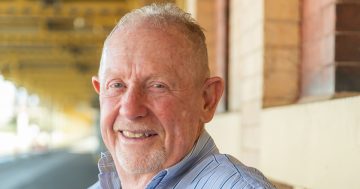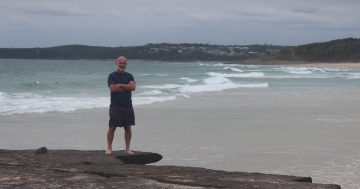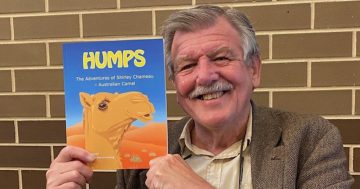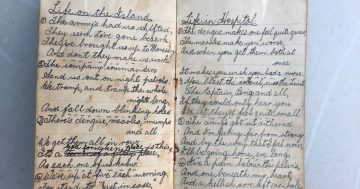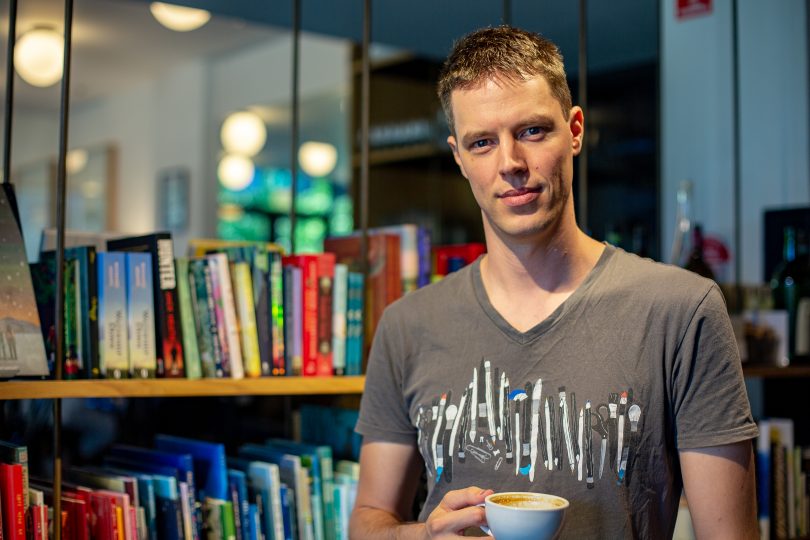
Canberra author Jack Heath’s latest book, Hunter, is a dark detective thriller. Photo: George Tsotsos.
“We all see the world the way serial killers do now. We swim through Tinder like we’re choosing victims, and we invite strangers into our cars if we have an uber sticker on the back. Pornography turns love and relationships into something that can be immediately dismissed when no longer convenient, we no longer recognise the humanity in other people.”
That arguably extremely bleak world view is being offered to me on a sunny March morning at Muse in Kingston, where Canberra author Jack Heath is cheerfully stirring his coffee, tucking into bread and jam and looking like that nice bloke who grew up down your street. The writer who made his reputation writing young adult fiction is advancing an argument for why the anti-hero in his new book, Hunter, is a cannibal detective.
No, don’t double back. You read that correctly. Timothy Blake helps out the FBI with tough cases, and sometimes he eats them (and no, this book is definitely not young adult fiction. At all).
Heath readily accepts that while there’s no such thing as a book that everyone likes, he’ll be pushing his luck with some readers. But Blake’s also a fascinating writing exercise. “He should, on paper, be unforgivable and he is. But I used everything I had to make him likeable.
“I gave him huge damage in his background, the kind of skills that make us like a person. The people he eats were irredeemable and were going to die anyway. I wanted the reader to start liking him but be uncomfortable about it,” he says.
There’s more to this than the shock value though: Heath’s also interested in how technology has objectified bodies, divorcing them from their humanity, and in how much we’re all hiding about ourselves deep down.
“I’m interested in how the person we wish we were doesn’t match the person we are. The decisions we make don’t match our internal compass especially if we feel compelled to keep something a secret, whether it’s eating people or using pornography or having an affair. It becomes impossible to correct these behaviours when they’re hidden.”
He’s thoughtful about how to write female characters so that victimhood doesn’t wholly define them, but says stepping into Timothy Blake’s head was both scary and liberating.
“I didn’t have to worry about him acting nobly or doing things that are in good taste. I feel like these days you are pressured to always have the correct opinion from the beginning. Fiction liberates you from that. You can explore a controversial idea, have your characters argue it with one another and then step back because it’s just fiction.”
I wonder whether readers enjoy his books because they’re a safe way to step into unimaginable darkness and he agrees that we gravitate towards dangerous ideas. But, he adds, readers see aspects of Timothy Blake in themselves too.
“He believes that he’s a terrible person – and he is. And that he must keep that a secret from everyone else. He suspects people dislike him, and in fact, they do. People who have any experience with depression tend to recognise the feelings of keeping a secret that you are a dreadful person, except in his case it’s true.”
The first book in the current series, Hangman, was a very tough sell indeed to publishers but has become a runaway success here and overseas. Hunger came out of discussions with US producers workshopping a potential television series. They wanted to know what would happen next.
“So I wrote some breakdowns and thought I’d show them to my publisher. They liked the material enough for a second book, and the cliffhangers were already there because of the episode structure.”
There’s always a lot of rewriting along the way. “I think the saying goes that no plan survives first contact with the enemy!” he says. Heath takes around 200 hours to write the first draft and around 800 hours of editing. He’s disciplined about sitting down to write, taking meal breaks and collecting his four-year-old from school at the end of the working day.
He’s not sure whether there will be more Timothy Blake thrillers, although their success after a career writing young adult fiction has taken him by surprise. Fundamentally, he writes for himself.
“If you start writing for the market or writing a book you don’t believe in, readers sense that and it will start to die. The challenge is staying focused, not wondering what the reviews will say or whether the readers will like it. All of that is a distraction from what would be going through Timothy Blake’s head at this moment.”
‘Hunter’ is available at bookstores and online.
Original Article published by Genevieve Jacobs on The RiotACT.








